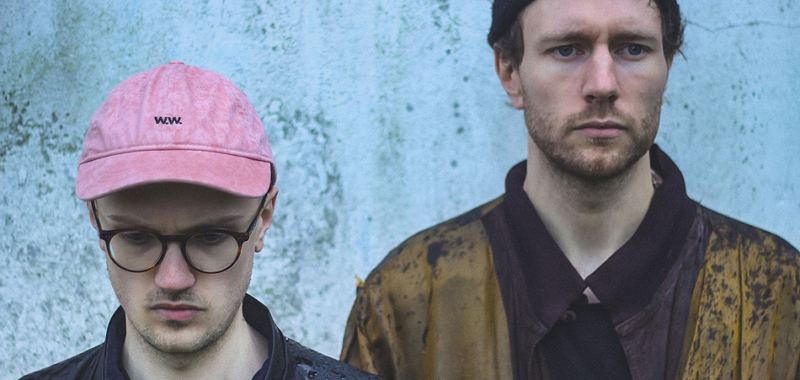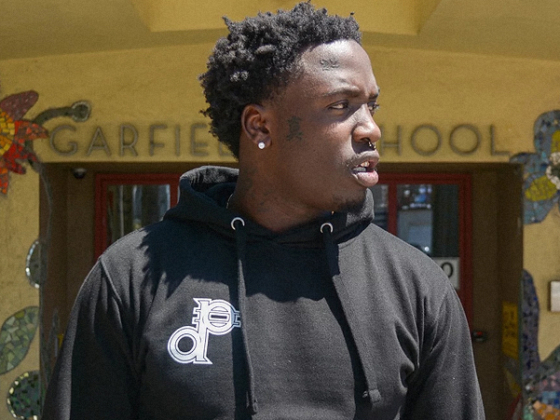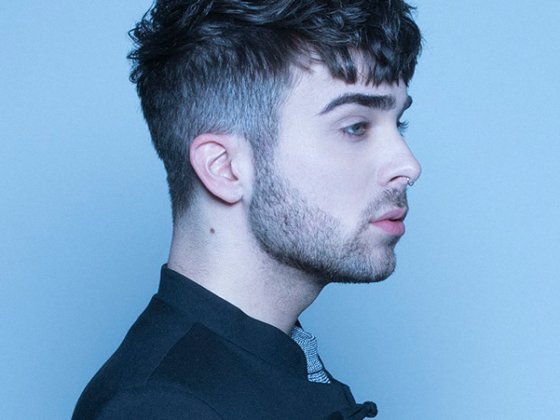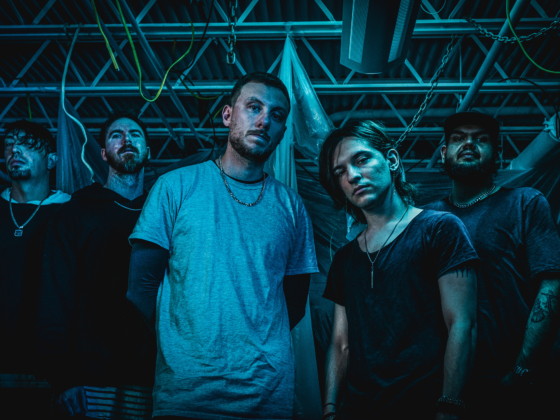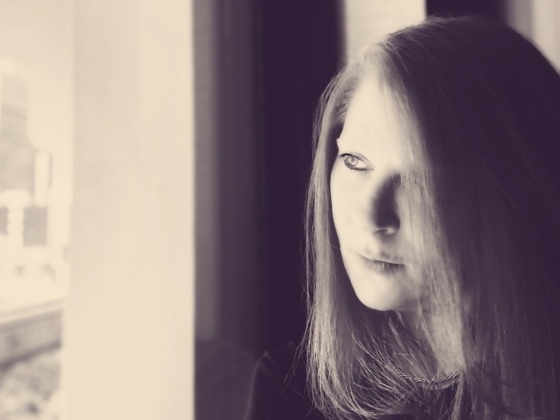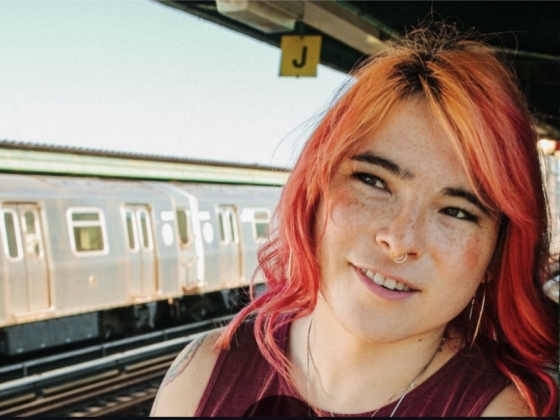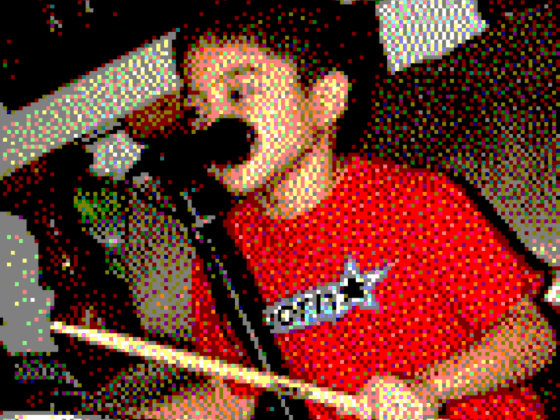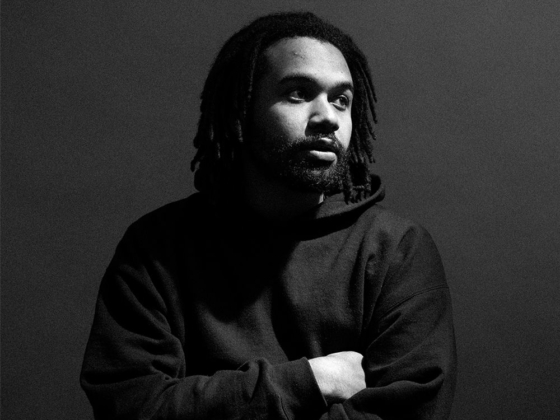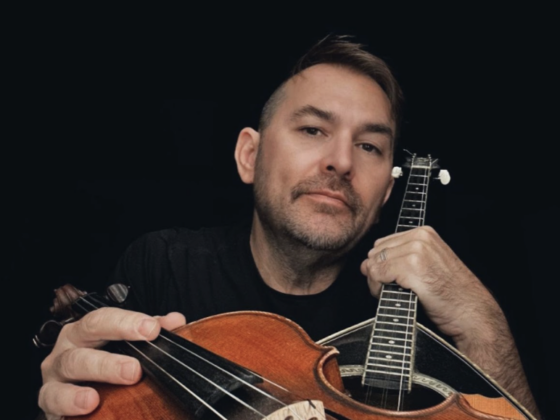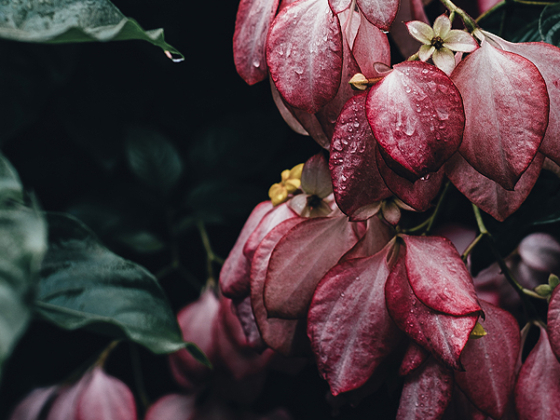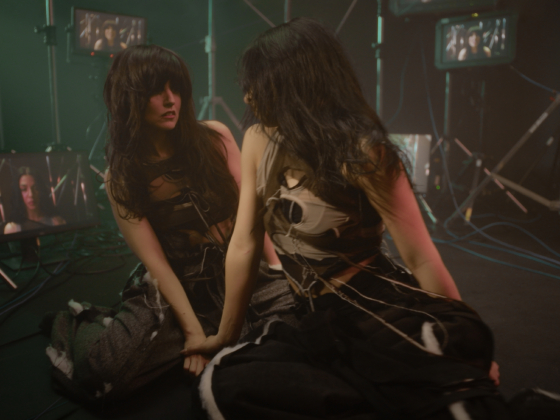On November 10th 2017 Novo Amor (Ali Lacey) and Ed Tullett released the remarkable Heiress; a wonderfully compelling collaborative feature length album, and possibly the most dynamic and spine-tingling musical release of 2017. Throughout Heiress the pair have crafted a beautiful sonic story, characterised by its entire duality; unexpected loud, climactic, bold swells, and yet also reaching mind-blowing pin-drop quiets. The result is stunning, and Heiress is as absorbing, as it is enjoyable. The release exhibits a really unexpected journey throughout, gracefully combined with both of their emotive, and highly evocative, floating falsettos.
The live performance of "Freehand" above shows just how drawn into those moments the two musicians can take the listener; emotionally wrapped into such a focussed, absorbing place. Their music is the nourishing equivalent of life in winter, glowing, wholesome and warm. After the humble duo, played a sold out gig at Shoreditch Town Hall, London, I caught up with them on behalf of EARMILK to hear more about them both, and the making of the album.
Heiress is a collaboration, written and recorded together in my old home. A chance to follow contrasting ideas, it's a record that clashes calm with raw intensity; rough around the edges from the environment in which it was created. So grateful for your listening. – Novo Amor
EM: You’ve written a lot together previously. Did you feel like there was a story on the album you wanted to tell?
Ed: We usually think about it sonically more than anything else I think. I mean no really, we just wanted to do something kind of different, stuff that Ali wouldn’t normally release, or do.
Ali: Yeah, I wanted to separate it from the things that I was doing, and Ed wanted to separate it from the things he was doing. How it’s different from my music is that Ed wrote all the lyrics for this stuff, and his voice is so prominent over all of it. We co-produced it together. There’s a lot of songs that I really wouldn’t have wanted to put out on my own, and stuff that didn’t really fit Ed’s style. It was a chance to explore a slightly heavier side of things. It’s a bit more instrumentally focussed. The way I’ve put it in the past is, my solo music is more instantly felt about, and this is more thought about.
EM: Yeah, it’s really something special. I loved that in your set you have these moments of very quiet intimate, sensitive sections, but it's also juxtaposed in the songs with louder, in your face sort of points, which feel more urgent. It’s something that’s very unique about your music together. It’s almost like a sonic opposite of sounds. Is that something that you aspire to make?
Ed: I think we’ve both always been fans of very dynamic music. I think Ali’s solo stuff does this as well, but when we work together I always want to push it a bit further towards the “rock” side of things, and the more heavier guitar stuff. I mean a couple of songs we ended up cutting from the record were even more towards that; more guitar-based and heavier. I mean not like metal, but the heavier bits of songs like “Cavalry” that sort of sound. We both of grew up listening to a lot of rock, and metal influenced music. I think it’s nice to show, and have those influences come through. It just makes more original music I guess.
Ali: It’s a lot more fun to play as well. You don’t have to feel so serious about it all, when you have something a bit more upbeat, with a dynamic urgency to it. We never thought about playing this stuff live when we were making it, but now that it’s all together; the mix of that stuff and my music I think it creates a good dynamic live set. It’s not just on all one level.
EM: It’s the same for the violin in your live show. I loved that it was just having so many moments. It seemed to command so much stage, and attention. Definitely, dynamic is the word for it. It just added a whole other dimension to what you were doing. That was so nice live. How did you both come to make music?
Ali: Myself, I grew up with my dad listening to music, he’s a keen guitarist and drummer, but he never did it professionally or anything. Then around 12/13 I got really into skateboarding, and the music world that flowed around that – punk & rock. I started going to music shops and finding albums I actually really liked. Skateboarding disappeared, and I found myself wondering how music was actually made. Since then it’s been playing in bands, and learning how to produce music. I never really looked back, or had any other interests, or even gave myself a plan B. I just kept making things. 4 years ago, I guess, the Novo Amor stuff came about and it took priority over everything I was doing. There were so many other musical projects I was doing; some more cinematic, some more electronic, and just none of it anyone’s really heard.
Ed: I didn’t really have a musical family, although my brother plays guitar. He started before me, much to my jealousy! When I was 13 I started playing too, but I fell out of love with it for a little bit. I started writing songs when I was around that age, really terrible acoustic songs, that were really bad. After sixth form I was going to head off to Uni in London, but I got signed by a label in the US, and decided not to go to Uni. I did some cool stuff with that, and then I met Ali, changed to a different publisher, and started doing stuff with him.
EM: Sounds pretty formative, and it’s got you to now, which is certainly an exciting place! It’s nice when I interview bands that I’m often quite surprised. Bands that are making a very specific style now they’ll have previously been in bands with a completely different approach. I think that’s awesome that as a musician they just want to make all different types. I think it's just infectious that you feel like you have to create? It’s nice to find these hidden things.
Ed: Yeah I think I really enjoy hearing that people I meet at a similar stage in their career in music have that background when they used to be in bands, when they listen to a lot of rock music, or any music they don’t really listen to nowadays. It’s kind of cool because a lot of people had that very similar formative process. Ali was in a screamo band!
Ali: It’s usually the case for a lot of artists because no one starts playing guitar at 12 because they want to make money. They do it because they just want to be able to learn how to play guitar, and their favourite songs. I don’t think anyone really thinks about a career in it. I guess when you’re that age you dream of being the Foo Fighters, or something I don’t know. You’re just all for the music.
EM: After I listened to Heiress I went away and listened to both your music separately. I felt that Ed’s was really quite different from the stuff you were putting out together – quite electronic?
Ali: I used to make more electronic music, and that’s because I see myself as more of a music producer than a songwriter or musician really. I’m just so interested in how sounds are made, and how music comes together. Ed has a whole album of electronic music.
Ed: There’s probably two reasons for that, Ali produced our stuff, and it is stylistically within the same realm. It’s also partly my fault because I have this penchant for hearing something I really like and then being like “OOoO I want to be involved too!” and that’s what it was a bit like with Ali at first. In terms of new stuff I like making music in a many genres as I can I think most people do this, but any music that most people hear that they really like, they just think “OOoO I want to make something like that.” You’ll listen to a new record every week, and think actually I want to go something more like this with it. It’s not copying necessarily it’s just like being influenced by something, and being excited about something. There’s a couple of different projects I’m working on at the moment, two other collaborative projects that are again very different, and represent different style of music I’m influenced by.
EM: I make, and produce a lot of music, but I find it difficult because it can be quite isolating. Do you feel that as well sometimes? It must be nice to have met each other, and actually work together in a longer-term collaboration.
Ali: Oh yeah. I feel like the last year for me – I’ve been enjoying making music on my own for a few years. Since, I’ve been in a better headspace about it all, and it’s all going well, but previously I have been so unmotivated to do anything, or make anything. Sitting on my own in my studio with all of these instruments I just felt quite uninspired. It’s really tough to kind of get out of this lonely headspace. Having other people around can sometimes really change that, and make you really want to make things.
Ed: It’s something both of us have felt a lot in the last year. I do a lot of co-writing etc with other people, whereas Ali mostly just focuses on his stuff.
EM: Can you tell me about the “Terraform” video? It seems like it was important to show a place where life was very different. I was interested to hear from you why you chose that particular story. For me it really stood out, as a choice for your visuals. It feels like it really fits this idea of “Terraform” being worldly, perfectly. A lot of artists / musicians don’t tend to shine a light on some of these things that are happening, especially in much more mainstream music – it can weirdly feel so removed from being in touch with people.
Ed: I was working with Sil and Jorik on another video, which hasn’t been released yet. We were looking for a brief for Terraform. We got them to send something over. It was their idea, we can’t necessarily take much credit for it. As soon as we read it we were like, wow, this is incredible; this place is amazing, these people are amazing. It’s really great to have been able to make some small difference in terms of raising some money for that as well. It’s just incredible.
Ali: The producer and director set up a charity, or a fund to help the miner’s kids and their working conditions, and already they’ve raised thousands and thousands of dollars, which over there can go such a long way. It’s just nice to feel more attached to a music video. I mean we didn’t have any thoughts or ideas about the video before we put out for a brief, and then this came in and we thought, “it’s perfect.” We didn’t set out to make a video that was going to raise awareness or help people, but now that we have I’m just so pleased that we did. Having a video that has another side to it, it’s just so real, it’s actually helping people. It’s great. This video just goes so much deeper than all my other videos. It’s amazing.
"Covered in everything
Coveted all at once
Everything covering
Everything all at once" – Ed Tullett
EM: I’d love to know more about the album lyrically. It’s flooded with metaphors, and seems very reflective, using a lot of creative writing. Were there some themes you visited?
Ed: I wrote 99% of the lyrics for it, which is usually what we do for the collaborative stuff. I guess it helps separate it from Ali’s solo work. The writing style is very ambiguous and cryptic. I did some annotations on genius. I like leaving a lot open to interpretation anyway. There’s not that much of a general theme, other than there’s a lot of stuff about death, whether that’s literal death or be it death of relationships both platonic or romantic, or changes in that sense. It’s kind of song-to-song basis really. Lyrically it was very instant and more subconscious, and sometimes it’s about finding meanings afterwards. Sonically it was more cohesive. I think that’s always been the focus.
Ali: The writing style is very ambiguous.
EM: How did you settle on the ten songs for the album?
Ed: we wrote the basis for a lot of songs on a couple of acoustic guitars, and then later on, on piano, so “Silvery” was written on piano, “Terraform”, “Freehand” “Pteryla.” “Amateur Blood” was a song that Ali was already doing for himself that he wasn’t going to use and we wrote the end of it, and ended up using for our stuff. “Euphor” was the first song we ever wrote together in late 2013. A lot of it has been written for a long time. The main thing we knew was that we had a lot of stuff together that we really liked that we wanted to make an album. We just had so much material that we wanted to make that it ended up being a record.
Ali: it was kind of the case of us recording acoustic guitar versions of all the songs and then revisiting and building them up slowly into big pieces, like layering and layering. Some of them we changed choruses once we realised the song wasn’t going to work, and some of them we just didn’t use. It wasn’t like we wrote ten songs and thought these are the ones we’re going to produce. It was more like, we wrote them, recorded a base for them and kept going. In total there was maybe 15 song ideas that we had.
EM: Ali, I gather you recorded a lot of the album in your kitchen at your old house? I hear they have the best acoustics!
Ali: Well, it wasn’t in the kitchen, but in my old house I had my studio set-up in my bedroom. There was another room with my drum kit in, and another with my piano in. the piano was downstairs right next to the kitchen, so a lot of the times I’d be cooking dinner, and then Ed would just be playing piano in the next room, just jamming out ideas. Things like “Terraform” and “Freehand” were probably created while I was making pasta or something.
EM: How important was it to make an album together?
Ed: I was always really into music in terms of listening to albums, and appreciating them as a whole. It was weird to me that there were these really good songs that were never being heard anywhere because they were “album songs”. It’s one reason why I like making records, because I think that’s how I grew up listening to music. Still, when a new release comes out from someone’s music that I love like Sufjan Stevens or Fleet Foxes, I’ll purposefully not listen to singles. I’ll wait until the album is out, and really take my time to listen to it. It’s just how I like digesting music.
EM: What’s next for you both?
Ali: We’ve been working on this album for so long sporadically; it’s also kind of nice to be done with it. Of course as much as we’re friends with each other and like making music together, but Ed has his own things he wants to focus on, and I’ve got my debut I’m making at the moment. I still see Ed and all Summer we’ve been hanging out putting together this new live band, and just writing bits towards my album as well. For me, it’s spending the rest of this year, and early next year producing my album, and getting on with some more Novo Amor shows next year.
Ed: I’m excited to be a part of that as well. I mean for me, I’m doing a lot of co-writing and production for other people, but there are a couple of collaborative projects that I’m working on and really, really excited about. Full albums, and stuff, so yeah! The gig felt almost like closure on the record, everything was out and we can start to focus on new things. It felt like a really good point to say: “We’re done now.”
Connect with Novo Amor: Facebook | Twitter | Spotify
Connect with Ed Tullett: Facebook | Twitter | Spotify
Photo by Alex Kozobolis

